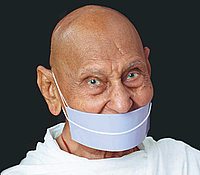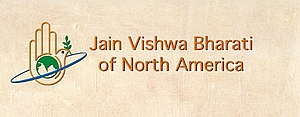From Acharya Tulsi
Prani-matra mein sahaj hi
Hoti sukh ki chah
Bhranta-jagat mein khojana
Mushkil sukh ki rah
The desire for happiness is the fundamental instinct in every being. To find the way to happiness is not an easy matter in this world that is replete with illusions. ____________________________
Regular Sessions Tuesdays - 7:30PM - 8:30PM - JVB Iselin Center
Swadhyay
Thursdays - 7:30PM - 8:30PM - JVB Iselin Center
Youth Forum
3rd Friday of every month - 7PM - 9PM - JVB Iselin Center - Upcoming - May 20
Samayik
Saturdays - 7PM - 8PM - JVB Iselin Center
Prayer, Meditation & Swadhyay
Sundays - 10AM - 11:30AM - JVB Iselin Center
Gyanshala
Two Sundays every month - 3:30PM - 6PM - Franklin Temple Classrooms
Pakshik Pratikraman
Every Pakkhi - 7:30 PM - JVB Iselin Center - Upcoming - May 6, 21 Online Classroom Weekly - 2nd quarter in progress - Ajeev 101 - began April 1, 2016 | |

Transcendental and Pragmatic (Nischay and Vyavahar) Anekanta has defined both the subtle and the gross and presented their respective perspectives.The two perspectives are the nischay naya or the transcendental perspective and the vyavahara naya or the pragmatic perspective. To know the subtle truths the nischay naya helps and to know the gross truths, vyavahara naya helps.
When both these perspectives are relative, mutually connected, then we arrive at the conclusion that similarity and dissimilarity are not independent but mutually connected. A whole thinking based on mutual connection that Jain seers of medieval times have done a great deal of work and with every philosophy have shown the path of concord.
One Jain seer has written that there is no difference between soul and matter. The difference is only in one attribute. The soul is the sentient and the body is not. Both the soul and body have infinite attributes.
Amongst all these attributes the difference lies only in one: that the soul is the sentient and body is not.
This is a very significant observation. Indeed when there is large similarity, the difference is created by a single attribute.
Excerpts from "ANEKANTA THE THIRD EYE" by Acharya Mahaprajna
| | | SUNDAY MORNING PRAYER, MEDITATION & SWADHYAY
10-10:15 AM – Prayer
10:15-10:45 AM – Preksha Meditation
10:45-11:30 AM – Philosophical discussion based on the book
Jain Darshan - Manan Aur Mimansa written by Acharyashri Mahapragya
At the JVBNA Iselin Center
While Prayer will help you connect with the divine, Meditation has the potential of connecting you with your soul. And an invigorating discussion of Jain philosophy based on Acharya Mahapragyaji’s celebrated book (a true gem of Jain philosophy) will help you truly understand and appreciate what its all about. Bring your questions, bring your curiosity, bring your interpretation! Learn from Acharyashri, learn from Samanijis, learn from each other! Be there! | | | Join us for Annual Spiritual Family Camp June 10 from 6 PM to June 12 until 2 PM at Poconos, PA The theme of the camp is: Jain Yog Based on the book by
Acharyashri Mahapragya
Jain-Yog-Punruddharak - Resurrector of Jain Yog
With the blessings of Acharyashri Mahashraman,
the camp will be led by
six distinguished Samanijis from Jain Vishwa Bharati Samani Bhavit Pragyaji & Samani Kanchan Pragyaji
(From JVB Orlando)
Samani Sanmati Pragyaji & Samani Jayant Pragyaji
(From JVB New Jersey)
Samani Vikas Pragyaji & Samani Maryada Pragyaji
(From JVB Houston)
While the colloquial term of Indian Yoga is synonymous to physical fitness, Jain Yog is centuries’ old philosophy and practice encompassing Jain principles and values to ensure fitness of the soul at the emotional, mental, social and spiritual levels as well. Various scholars like Acharya Haribhadrasuriji and Hemchandracharyaji have written volumes on this topic in past. While it got lost in the interim, it is back at the forefront and this is a perfect opportunity to understand and implement these pearls to live a balanced life. Samanijis will be integrating topics based on the book ‘Jain Yog’ by Acharyshri Mahapragyaji to blend Jain philosophy, modern psychology and valuable practice for the present day Jain.
The three day camp will be time to immerse into the science of living and understand fitness of our soul – the Jain Way.
| | There will be parallel sessions for youth and children age 5 & up, complete with interactive lectures, practical sessions, games and crafts. These sessions will be conducted by Samanijis and volunteers.
Camp Dates: 10th June from 6PM to 12th June until 2 PM
Venue: Arsh Vidya, 651 Route 115, Saylorsburg, PA 18353
Registration Fee: $125 per person age 16 & above.
Free for Annual Danveer, Punyamitra, and Hitaishi contributors, based on a family size of 2 adults and all children under age 16. The fees cover program participation, meals, & accommodation (Private rooms for families; singles share a double occupancy room).
Registration Deadline - May 25, 2016.
Late Registration Fee - $25 per person | | Please fill out and submit the e-form, and then mail/deliver payment, if any, to JVBNA Center - 151 Middlesex Avenue, Iselin, NJ 08830, before the deadline of May 25, 2016. | | To know more about the theme of the camp, please call Samanijis at
(732) 404-1430. For general and logistics related queries, please write to Family Camp Team at . | | | | | |  
Samanjis' Swagat Samaroh A Swagat Samaroh was held on April 9, 2016 at the Center for Peace and Meditation for Samani Sanmati Pragyaji and Samani Jayant Pragyaji. The program began with auspicious Navkar Mantra led by Samanijis. Master of the ceremony, Kusum Jain introduced and welcomed the Samanijis. JVBNA choir comprising Kamal Daga, Sumitra Kankariya, Sushma Sodhia, Shilpa Bhansali, and Rajiv Jain presented the Manglacharan. Several members of the JVBNA family including Chairman Pratap Jain, Director Mool Singhi, Director Ramesh Parmar, and President Madhumita Sacheti spoke and welcomed Samani Sanmati Pragyaji and Samani Jayant Pragyaji expressing their gratitude for Samanijis' vision and guidance that that would be instrumental in helping make the new center all it can be to support expanded programming to further the spiritual growth of the community. Director Surendra Kankariya and Director Rohit Jain both recited "Welcome Poems" and Kiran Nahata sang a melodious Swagat Geet. Samani Sanmati Pragyaji and Samani Jayant Pragyaji blessed and congratulated the members for their spiritual progress as well as progress with regards to making the dream of the new center come true in spite of all odds. They inspired all to contribute their time, talent and resources and work towards making the Center for Peace and Meditation true to its name. The program ended with Mangal Path. Photo Gallery | | | Youth Forum Report for April Session
By Paras Nahar
In our latest Jain Youth Forum session, Kiran Aunty and Sunil Uncle piloted a discussion in which JYF members were exposed to provide thoughts and ideas on how to make our sessions more oriented towards our wants and pursuits. A consensus was achieved in which it was decided that our sessions would focus on delving into more Jain philosophies.
Afterwards, Samaniji delivered a lecture regarding: The Effects of Mental Health on Physical Health. The ensuing paragraph summarizes the whole of Samaniji's speech.
One's body is affected and impacted by one's emotions and energy; the tangible is manipulated and developed by the intangible. A correlation has been drawn between one's emotional health to one's physical health. Emotions and thoughts of negative connotation will result in physical distress. A mental disorder or imbalance, such as depression, will debilitate the human body. For instance, depression is known to induce chronic joint pain, back pain, gastrointestinal problems, incessant fatigue and sleep disturbances. The explanation for the connection between the mind and body is quite scientific. When an individual is emotionally imbalanced, stimuli in the nervous system will over simulate the vague nerve, a nerve that causes pain and nausea when over simulated. Hormones, during times of emotional distress, release chemicals that can also initiate physical discomfort. Therefore, in order to maintain one's health, one must prohibit all negativity from entering one's mind. This can be achieved through meditation and breathing exercises. These practices, whether it be meditation or breathing exercises, must be done unfailingly and wholeheartedly if one wants to see a difference in themselves.
Samaniji's lecture branched off into Preksha Dhyan for it is a method of prohibiting negative thoughts from entering one's mind. Preksha Dhyan's slogan is "See yourself through yourself." In this instance, "seeing" does not mean external vision, but concentrated impartial perception of one's true self. Instead of witnessing external anomalies and beauty, one will witness their internal anomalies and beauty.
| | | Logassa Sutra
Logassa Sutra is an eulogy of the twenty-four Tirthankars of each of the past, present, and future cycles is performed. A prayer is also made to seek the help through the Three Jewels.
logassa ujjoyagare, dhammatitthayare jiNe |
arahante kittaissam, chauviisampi kevalii ||
Who have enlightened the world,
have established the dharma-tirtha,
I praise the Arhantas,
the 24 kevalis.
usabham_ajiyam cha vande, sambhavam_abhinadaNam cha sumaim cha|
paumappaham supaasam, jiNam cha chandappaham vande ||
I worhship Rishabha, & Ajita,
Sambhava, Abhinandana and Sumati,
Padmaprabha, Suparshva,
I worship the Chandraprabha Jina.
suvihim cha pupphadantam, siyal-sijjansa-vaasupujjam cha |
viamalam_aNantam cha jiNam, dhammam santi cha vandaami ||
Suvidhi or Pushpadanta,
Shitala, Shreyansa and Vasupujya,
Vimala and Ananta Jina,
I worship Dharma and Shanti.
kunthum aram cha mallim, vande muNisuvvayam namijiNam cha |
vandaami riTThanemim, paasam taha vaddhamaNam cha ||
Kunthu, Ara and Malli,
I worship Muni-Suvrata and Nami Jina,
I worship AriShTanemi,
Parshva and Vardhman.
aevam maye abhithuaa, vihuya-rayamalaa pahiiNa-jara_maraNaa |
chauviisampi jiNavaraa, titthayaraa me pasiiyantu ||
These who I praise,
without the dirt of Karma, beyond old age and death,
the 24 Jinas,
may Tirthankaras bless me.
kittiya-vandiya-maye, je ae logassa uttamaa siddhaa |
aarogga-bohilabham, samaahivaram_uttamam dintu ||
Those who I praise and worship,
noble Siddhas in the world,
freedom from disease, possession of wisdom
give me the noble blessing of Samadhi.
chandesu nimmalayara, aaichchesu ahiyam payaasayaraa |
saagara_var_gambhiiraa siddhaa siddhim mama disantu ||
Cleaner than the moons,
brighter than the Suns,
deeper than ocean,
the Siddhas may bless me with Siddhi. | | | | |

